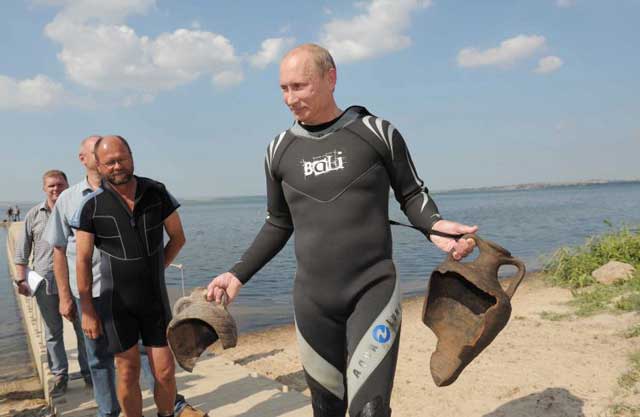Mary Dejevsky: Cameron's visit to Russia is a chance to end a doleful period

British Prime Ministers and diplomats have long been in thrall to what they fancied, until very recently, was a special relationship with the United States. The illusion distorted Britain's image of itself and skewed British foreign policy in a way that rarely benefited British interests. Unfortunately, there is another relationship that has been no less special and no less distorted, but in a rather different way.
Over the past decade or more our relations with Russia have been almost uniquely bad. One gauge of how difficult the relationship has been is the fact that David Cameron's visit to Moscow at the start of next week will be the first by a British Prime Minister since 2006. There have been routine bilateral encounters in the margins of international summits, but nothing that looked even remotely like Barack Obama's effort to press a re-set button. True, Vladimir Putin was accorded a state visit in 2003, when Russian President, but it seemed a grudging and perfunctory affair, long on ceremony and short on substance.
Similarly, Cameron's trip to Moscow is hardly ambitious. He is going for barely 24 hours. There has been some warm, fuzzy cultural activity in the preceding weeks, such as the statue of the first cosmonaut, Yuri Gagarin, unveiled outside the British Council offices in London and the Mariynsky ballet on tour from St Petersburg, but no advance on the political front. What is known about the agenda suggests that some usefully uncontentious subjects, including cybercrime, are up for discussion. The 9/11 anniversary also offers a safe topic for agreement. But this remains, in diplomatic terms, lowest common denominator stuff.
It also appears that Britain passed up an opportunity to make the visit more substantial. The Prime Minister arrives in Moscow only days after the end of the Yaroslavl forum, an annual gathering of politicians and business people that Dmitry Medvedev inaugurated when he became President. Cameron was apparently invited to give an address, but declined. If so, such a refusal could be seen as contradicting the Government's desire to make business more central to British diplomacy. More likely it should be taken as evidence of how determined Cameron is to keep every possible risk at bay – including the risk of being misinterpreted, not just in Russia, where the political climate can be fickle at the best of times, but in Britain.
The chief reason why there has been no prime ministerial visit to Moscow since 2006 can be summed up in one name: Alexander Litvinenko. The former Russian police officer – not a professional spy as such – died in a London hospital from radiation poisoning in what was almost universally seen in Britain as an assassination ordered by the Kremlin.
This version, driven largely by Litvinenko's anti-Putin sponsors in the Russian exile community in Britain, was also embraced, in public at least, by British government officials and remains the authorised version. Within weeks of Litvinenko's death, the Crown Prosecution Service had charged Andrei Lugovoi, a Russian businessman, possible secret agent and now MP, with involvement in the killing.
The refusal of the Russians to extradite Lugovoi appeared to anger the British authorities almost as much as the killing itself, and relations went into the deep freeze. The very fact of a prime ministerial visit will be hailed in Moscow as a sign the British are ready to lay the Litvinenko affair to rest. And while Cameron will want to avoid this impression – lest he be seen as a pushover – it is nonetheless the case. Lugovoi is now doubly protected – not just by Russia's constitutional ban on extraditing its own citizens, but by his immunity as an MP – and a date has finally been fixed, next month, for the formal inquest into Litvinenko's death, which would only have been done after hope of a trial had been abandoned. That the inquest will not be held until after Cameron's Moscow visit also suggests extreme care on the part of No 10 that nothing should derail this tentative rapprochement with Russia.
Much remains murky about Litvinenko's death, and I for one suspect the authorities – in both capitals – know far more than they have divulged. But it suited everyone at the time – except those concerned about worsening UK relations with Russia – to focus on the presumed assassination of a British citizen on British soil by particularly grisly means, rather than on how the radioactive material got into Britain and the precise sequence in which it was spread. This was a spy saga that conformed perfectly to British Cold War stereotypes of Russia, while uniting the interests of Putin's Russian enemies in London and those of a British government embroiled in a host of other disputes with Russia.
So, brief though it is, this visit is a chance to end a doleful period for UK-Russia relations, in which each side has rushed to believe the worst of the other. Those who think diplomacy should reflect a "values" agenda will be unhappy; those who believe in trade-led pragmatism will be cock-a-hoop. Cameron will doubtless do his best to offer something to both. But the best outcome would be the dawning of a recognition that this special relationship, like the other, has had its day.
Subscribe to Independent Premium to bookmark this article
Want to bookmark your favourite articles and stories to read or reference later? Start your Independent Premium subscription today.

Join our commenting forum
Join thought-provoking conversations, follow other Independent readers and see their replies